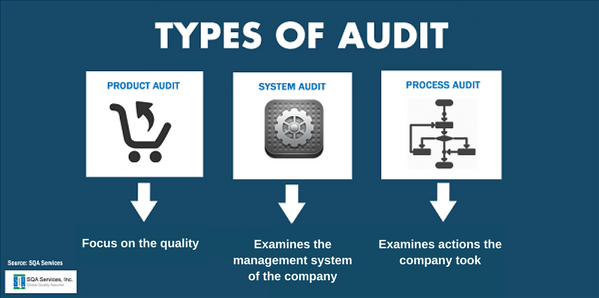Why do we conduct supplier quality audits? Before we go into specifics, we should first understand what an audit is and why it’s necessary.
An audit is a process of checking whether a supplier adheres to the industry standards set by independent organizations and the law. An audit is usually performed by a third party, but it’s also common practice for businesses to conduct their own supplier verifications. This is because some businesses require their suppliers to follow unique regulations. These businesses recognize that their suppliers have a share in the responsibility of maintaining their competitive edge.

An audit event can be divided into three separate audits:
- Products: The product audit focuses on the quality of the supplier’s outputs, including any additional services that accompany the tangible goods.
- Systems: The system audit refers to the supplier’s management system. The supplier uses the management system to continuously assess that quality is maintained throughout the process. The system involves cross-checking company policies with regulations that should be followed, from mandatory industry regulations, to what you as a client and auditor expect to see from your chosen suppliers.
- Processes: The process audit examines actions the company took to create the resulting products and services. This includes the quality of the raw materials, whether their equipment is up-to-date and well maintained, the performance of their human resources, and their working conditions. This ensures that the supplier is operating effectively and efficiently.
A fourth type of audit concentrates on documents, which can be performed separately or integrated within any of the three other audits. To reduce time, cost, and difficulty in conducting your own audit, you can also request to see the results of audits conducted by third-party auditors.
The key to dealing with any situation is in good preparation.
Send the supplier a list of what needs to be audited, the documents that they should have available to the auditor, and a brief description of the audit process.
An audit begins with an opening meeting, which should be attended by the supplier’s key personnel. At the meeting, the supplier should give the auditor an overview of the firm and their quality systems. This might not be necessary if the auditor is already familiar with the company through previous visits. There is no protocol for welcoming the auditor, but a positive experience at the opening meeting will help ensure that the entire audit goes smoothly.
Your auditor should strive to maintain a positive relationship with the supplier, and vice versa, throughout the audit.
After the opening meeting, the supplier should fully understand the aim and importance of the audit, and cooperate and prepare the necessary resources for the auditor. Auditors should be patient with the supplier—you are a partner to the supplier. Do not act like a police officer investigating a crime.
If the supplier cannot immediately provide an accurate response to your questions, allow them time to gather the essential information and get back to you. You should also realize that the supplier needs to protect its trade secrets, so some documents may be redacted to only reflect the information needed for the audit.
The process ends with a close-out meeting. This is like a consultation, where the auditor shares their findings and observations, as well as an analysis of all gathered information, with the supplier. The auditor also recommends improvements that the supplier could implement to improve its business or systems. All of this information is formally documented and sent to the supplier after the audit concludes. As such, it is best to reserve any discussion regarding the audit results until after the supplier receives a copy of the full report.
A follow-up audit should be performed to verify that the supplier has taken action on the improvements the auditor recommended. This provides assurance that important alterations have been completed, and time lapses have been remedied.
While audits can require extra work for your team, and can be intimidating for suppliers, this process will benefit your company business model and the product you produce. Loopholes, compulsory preventive measures that have yet to be adopted, and opportunities not yet optimized can sometimes only be identified through fresh eyes. Being open to the auditing process and maintaining a positive attitude and outlook conveys to your clients that you are dedicated to improving their business while also improving yours.
Updated 9 Sep 2025
